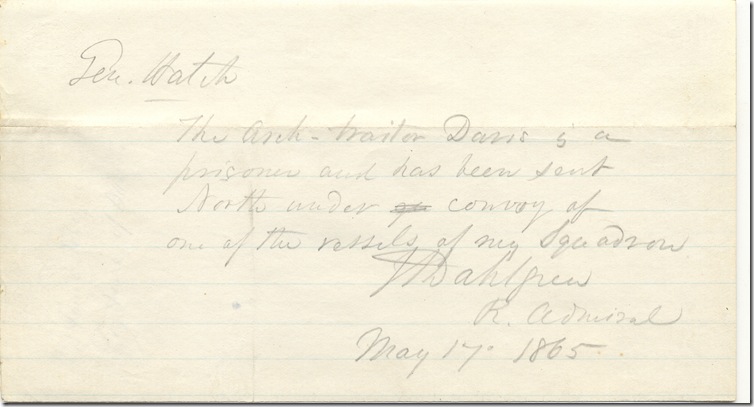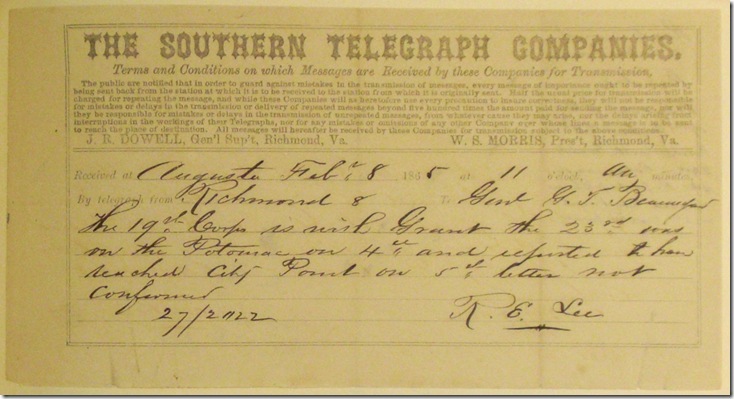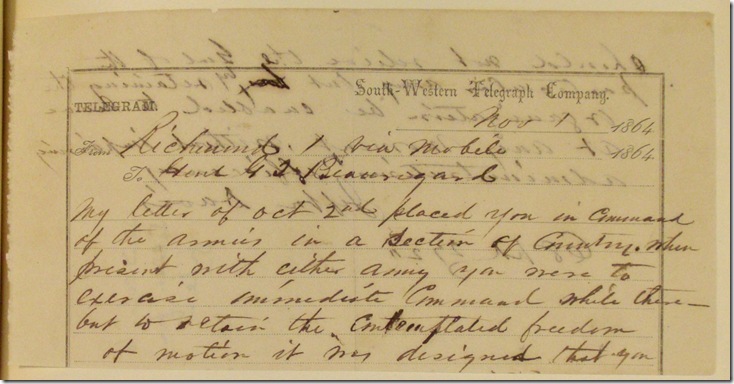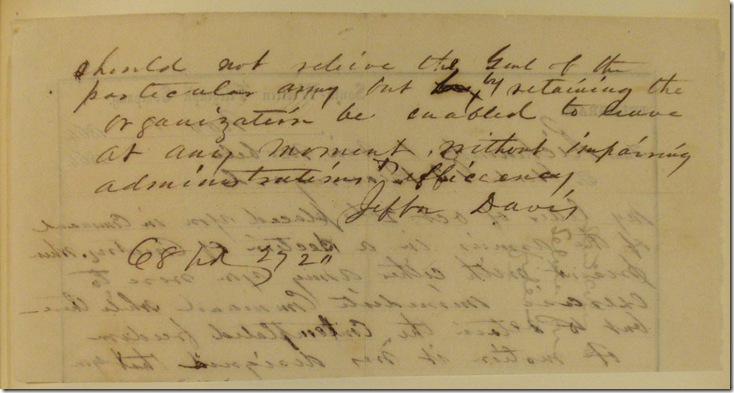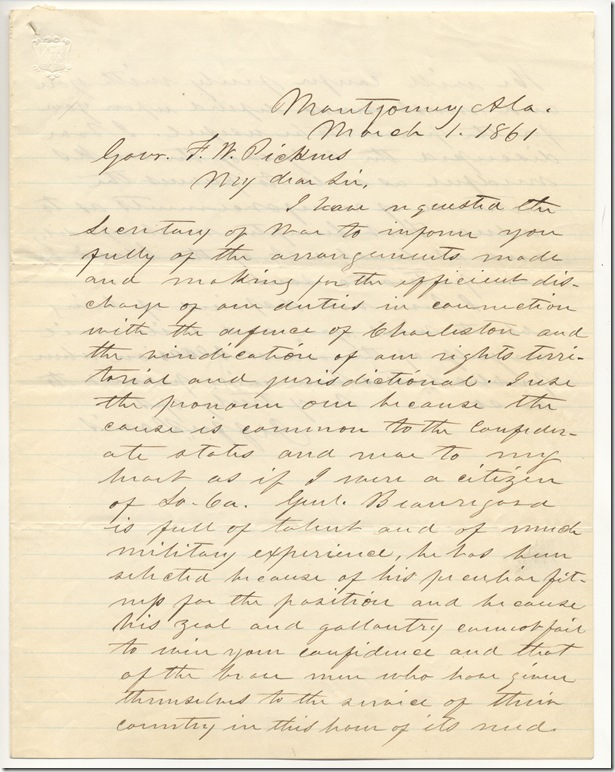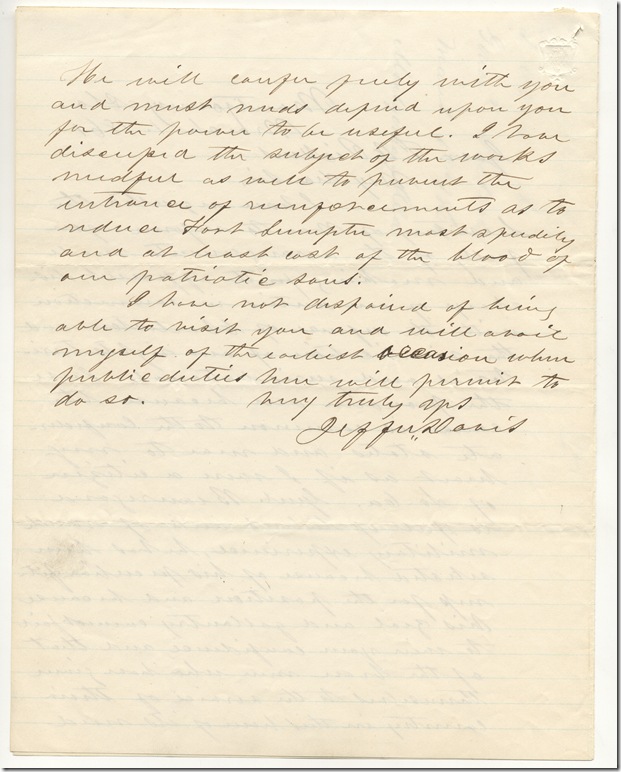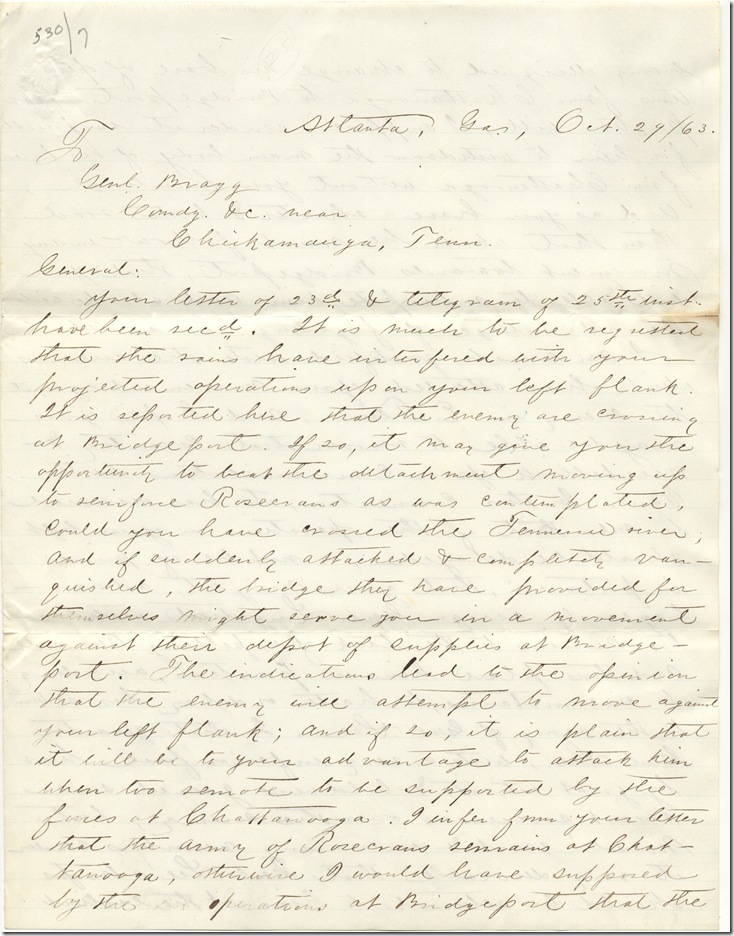
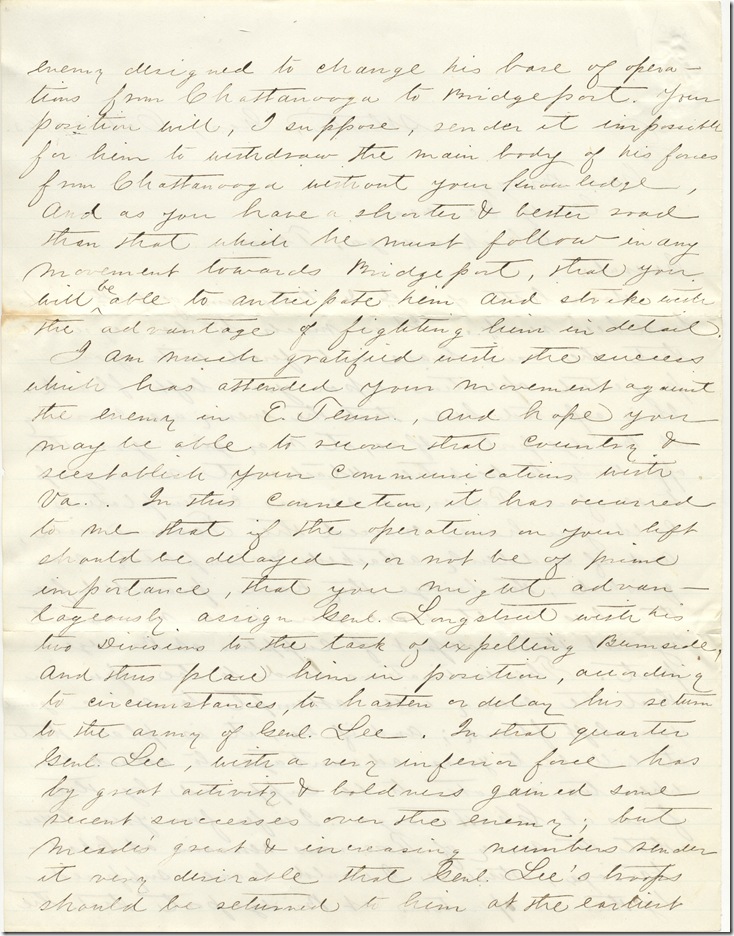
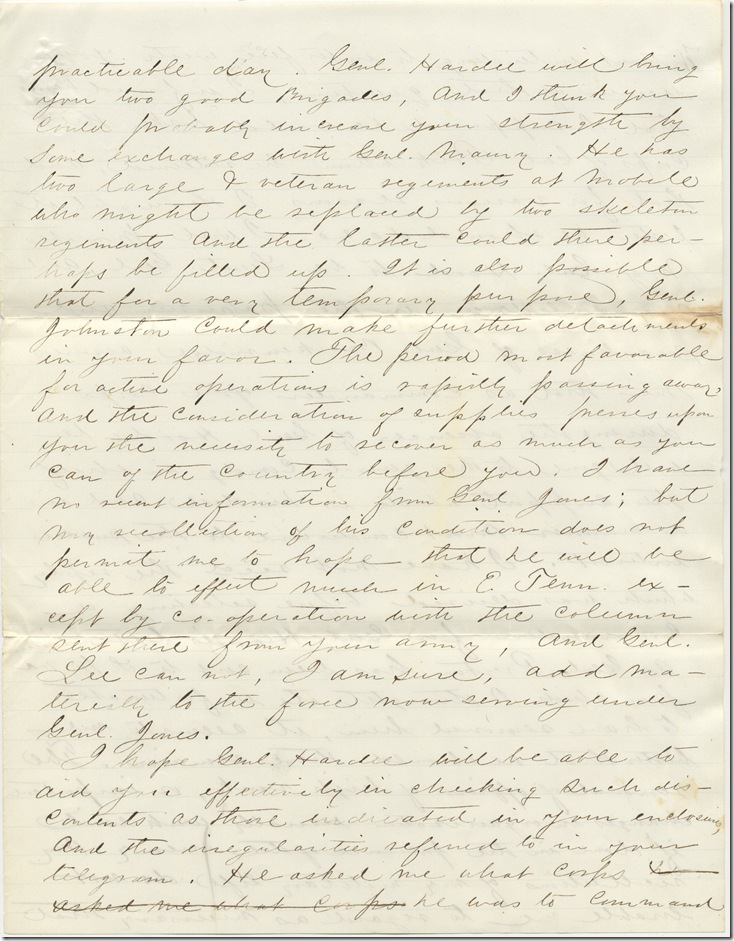
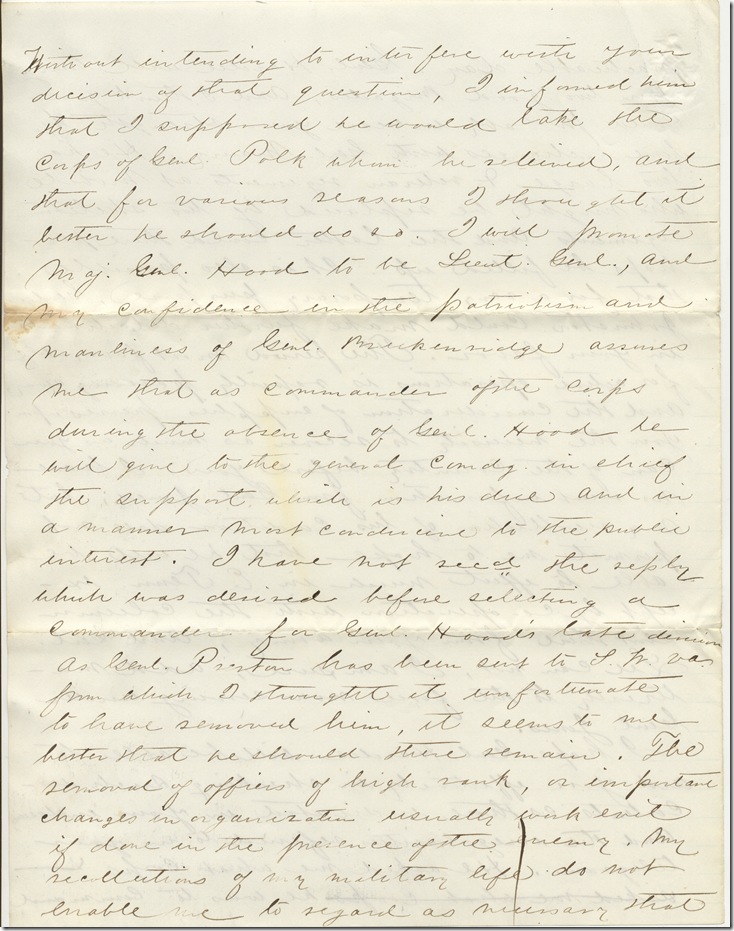
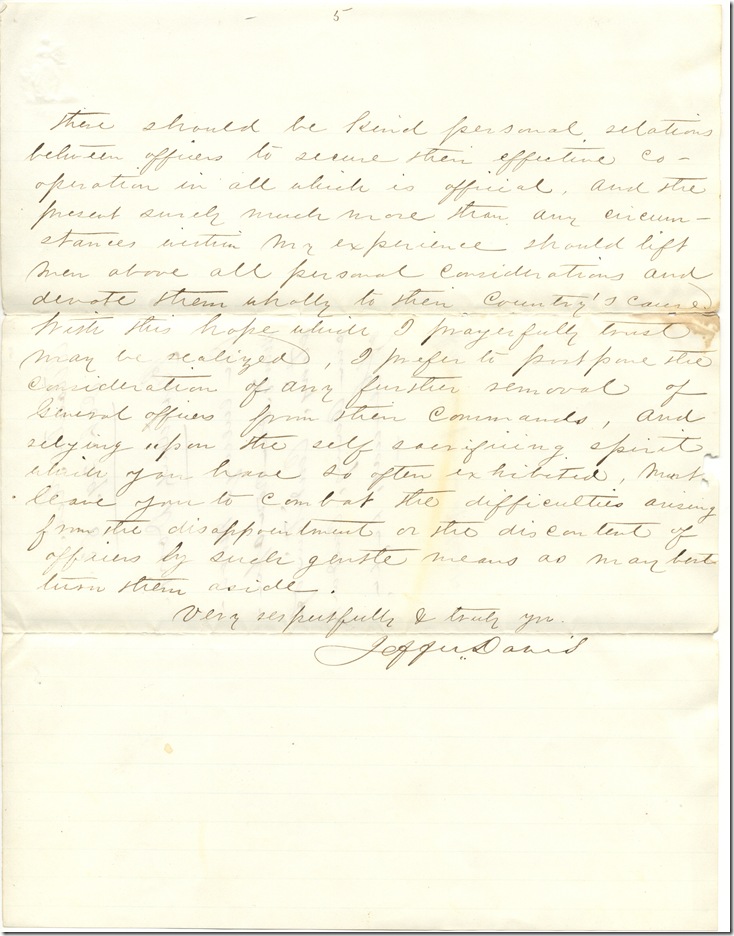
Transcript:
Atlanta, Ga, Oct. 29/63
To
Genl. Bragg
Comdg. &c near
Chickamauga, Tenn.
General:
Your letter of the 23rd & telegram of 25th inst. have been recd. It is much to be regretted that the rains have interfered with your projected operations upon your left flank. It is reported here that the enemy are crossing at Bridgeport. If so, it may give you the opportunity to beat the attachment moving up to reinforce Rosecrans as was contemplated, could you have crossed the Tennessee river; and if suddenly attacked & completely vanquished, the bridge they have provided for themselves might serve you in a movement against their depot of supplies at Bridgeport. The indications lead to the opinion that the enemy will attempt to move against your left flank; and if so, it is plain that it will be to your advantage to attack him when too remote to be supported by the forces at Chattanooga. I infer from your letter that the army of Rosecrans remains at Chattanooga, otherwise I would have supposed by the operations at Bridgeport that the enemy designed to change his base of operations from Chattanooga to Bridgeport. Your position will, I suppose, render it impossible for him to withdraw the main body of his forces from Chattanooga without your knowledge. And as you have a shorter & better road than that which he must follow in any movement towards Bridgeport, that you will be able to anticipate him and strike with the advantage of fighting him in detail.
I am much gratified with the success which has attended your movement against the enemy in E. Tenn., and hope you may be able to recover that country & reestablish your communications with Va. In this connection, it has occurred to me that if the operations on your left should be delayed, or not be of prime importance, that you might advantageously assign Genl. Longstreet with his two Divisions to the task of expelling Burnside, and thus place him in position, according to circumstances, to hasten or delay his return to the army of Genl. Lee. In that quarter Genl. Lee, with a very inferior force has by great activity & boldness gained some recent successes over the enemy; but Meade’s great & increasing numbers render it very desirable that Genl. Lee’s troops should be returned to him at the earliest practicable day. Genl. Hardee will bring you two good Brigades, and I think you could probably increase your strength by some exchanges with Genl. Maury. He has two large & veteran regiments at Mobile who might be replaced by two skeleton regiments and the latter could then perhaps be filled up. It is also possible that for a very temporary purpose, Genl. Johnston could make further detachments in your favor. The period most favorable for active operations is rapidly passing away, and the consideration of supplies presses upon you the necessity to recover as much as you can of the country before you. I have no recent information from Genl. James; but my recollection of his condition does not permit me to hope that he will be able to effect much in E. Tenn. except by co-operation with the column sent there from your army, and Genl. Lee can not, I am sure, add materially to the force now serving under Genl. James.
I hope Genl. Hardee will be able to aid you effectively in checking such discontents as those indicated in your enclosures, and the irregularities referred to in your telegram. He asked me what corps he was to command without intending to interfere with your decision of that question, I informed him that I supposed he would take the corps of Genl. Polk whom he relieved, and that for various reasons I thought it better he should do so. I will promote Maj. Genl. Hood to be Lieut. Genl., and my confidence in the patriotism and manliness of Genl. Breckinridge assures me that as commander of the corps during the absence of Genl. Hood he will give the general Comdg. in chief the support which is his due and in a manner most conducive to the public interest. I have not recd the reply which was desired before selecting a commander for Genl. Hood’s late division. As Genl. Preston has been sent to S. W. Va., from which I thought it unfortunate to have removed him, it seems to me better that he should there remain. The removal of officers of high rank, or important changes in organization usually work evil if done in the presence of the enemy. My recollections of my military life do not enable me to regard as necessary that there should be kind personal relations between officers to secure their effective co-operation in all which is official. And the present surely much more than any circumstances within my experience should lift men above all personal considerations and devote them wholly to their Country’s cause. With this hope which I prayerfully trust may be realized, I prefer to postpone the consideration of any further removal of General officers from their commands, and relying upon the self sacrificing spirit which you have so often exhibited, must leave you to combat the difficulties arising from the disappointment or the discontent of officers by such gentle means as may best turn them aside.
Very respectfully & truly yours
Jefferson Davis
Citation: Jefferson Davis (1808-1889), letter signed to Braxton Bragg. Atlanta, 29 October 1863. AMs 530/7
